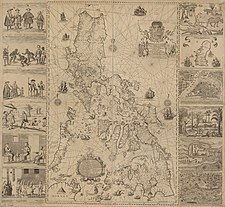This article needs additional citations for verification. (January 2013) |
| History of the Philippines |
|---|
 |
| Timeline |
|
|
The following is a listing of the sovereigns of the kingdoms in the Philippine archipelago before their dominions fell to either the Kingdom of the Spains and the Indies (mostly in the 16th or 17th century) or the United States of America (in the 20th century), and of their non-sovereign descendants that kept honorary titles.
Mentions of the King of Luzon by the Spanish king Charles V in a decree and correspondences and of the King of Cebu by Hernan Cortes, Spanish governor of New Spain, in his letter to him are found in Spanish records; these occurred in the first half of 16th century.
After the fall of particular Philippine dominions to the Kingdom of the Spains and the Indies which started in 1565, due to the much earlier Spanish royal authorization given to the royal audience and chancery of New Spain on 26 February 1538 to prohibit the title of "lord" from being adopted by the nobles of acquired overseas dominions, since, according to its author the Spanish queen Isabella, "it is convenient for our service and royal preeminence that they are not called [lords]" but principals, the particular Philippine nobles who swore allegiance to Spain became part of the "principalia" or Philippine principality and came to be considered as "principal Indians". This same authorization formed part of the Spanish Laws of the Indies as Law 5 of Title 7 of Book 6. The ranks in nobility were also reduced to practically the lowest one based on the truly common designation of "datu" equating it fully to being a "cabeza de barangay" or head of a barangay or town district, with an opportunity for a noble to be elected as "gobernadorcillo" or town governor by the same nobles. Nonetheless, they were given privileges comparable to Spanish nobility such as exemption from taxation, authority of governance, and inheritance of title and privileges; these had also been part of their previous powers albeit reduced. Upon converting to Christianity, these same nobles adopted the initially fairly exclusive titles of "don" and "doña". The occurrence of a Philippine noble becoming a "principal" was only mutually recognized by both the Spanish king and that noble after the noble swore allegiance to the Spanish king. In insular Spanish records, the principalia was also sometimes referred to as nobility, and principals also as nobles.
© MMXXIII Rich X Search. We shall prevail. All rights reserved. Rich X Search
